“Hello, Columbia!”
By Kyle R. Thomas
So often in the Tennessee Walking Horse industry — perhaps too often — we think about the term “horse shows” and put too much of our emphasis on the first word and not enough on the latter. Quite understandably, the focus is on the exhibitors and their entries, up to and including their lineage and results. But these are shows, events, complete with anthems and invocations, ticket sales and concessions. You can’t put on a show without a great product, and you have to have a great product in order to put on a show.
Chip Walters is an able practitioner of both the pomp and the circumstance, with a voice and cadence that have been honed through a lifetime of studying his craft. Born John Anderson Walters, this “chip off the old block” has studied the best announcers of multiple eras since his earliest days in Columbia, Tennessee.
To know Chip is to know this part of him, a man who can still easily close his eyes and turn the radio dial of his childhood to pick up Major League Baseball games around the country.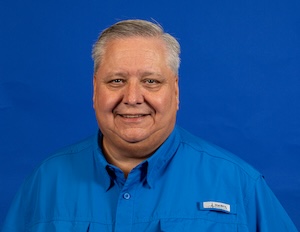 “In those days, WSM out of Nashville, 650 AM, they carried the [Atlanta] Braves at the time,” he said. “Henry Aaron, Dusty Baker, Ralph Garr, all those guys. Then I would turn from 650 to 700, which was WLW in Cincinnati. 720 was WGN, that was the [Chicago] Cubs.” He can rattle off the call signs for Dallas, Louisville, Cleveland, St. Louis and others. He hesitated to pick out a favorite. “I never would stay anywhere very long,” he said, although the radio stations out of Chicago also carried some rock ‘n roll. If his beloved Middle Tennessee State University ever needs a lecturer on sports radio broadcasting in the 1970s, Chip is the guy.
“In those days, WSM out of Nashville, 650 AM, they carried the [Atlanta] Braves at the time,” he said. “Henry Aaron, Dusty Baker, Ralph Garr, all those guys. Then I would turn from 650 to 700, which was WLW in Cincinnati. 720 was WGN, that was the [Chicago] Cubs.” He can rattle off the call signs for Dallas, Louisville, Cleveland, St. Louis and others. He hesitated to pick out a favorite. “I never would stay anywhere very long,” he said, although the radio stations out of Chicago also carried some rock ‘n roll. If his beloved Middle Tennessee State University ever needs a lecturer on sports radio broadcasting in the 1970s, Chip is the guy.
When asked about some of his early broadcasting inspirations, he was quick to distribute praise. Marty Brennaman, Jack Buck, Milo Hamilton and Ernie Johnson, Sr., were all early favorites, along with Paul Eells from Vanderbilt and the legendary John Ward from the University of Tennessee. There’s something you should know when it comes to announcers: they have great memories, and they also pay it forward.
Growing up on a small farm on the north side of Columbia, Chip spent his early years attending the Tennessee Walking Horse National Celebration, occupying box E-163 with his family. Chip would hear the voice of Emmett Guy announcing the show, and learn what he describes as, “what a horse show should sound like.” Not long after that, he was given his first chance at a microphone.
Chip has an Uncle Donny who provided the public address for the junior high and high school football games in Columbia for many years. One fateful night, when Chip was 12, his uncle turned to him and informed him that the public address was his that night. After his many years listening to radio broadcasters night after night, he wasn’t going to let the moment pass him by. But he says he was never nervous. “It didn't feel uncomfortable, no. You know, a lot of people have stage fright, and that just didn't happen. I guess part of that's just one of the little pieces of your own personality.”
Around this time, Chip started spending his Friday and Saturday evenings attending horse shows across the state, alongside his father and his friends. 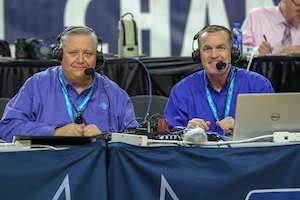 It was at these shows that Chip first met Bobby Sands, the longtime horse show announcer. Sands by that time had already developed a habit — one that he continues to this day — where he would take a few classes off during a one-night show and let a younger announcer take over the call. Chip was the beneficiary of a handful of these circumstances in his youth, and he fell right into the gait. After all, he knew what a horse show was supposed to sound like.
It was at these shows that Chip first met Bobby Sands, the longtime horse show announcer. Sands by that time had already developed a habit — one that he continues to this day — where he would take a few classes off during a one-night show and let a younger announcer take over the call. Chip was the beneficiary of a handful of these circumstances in his youth, and he fell right into the gait. After all, he knew what a horse show was supposed to sound like.
Attending high school at Columbia Central, Chip got to call the varsity basketball and football games for his classmates. One such classmate was basketball standout Fred Jenkins, who was being heavily recruited by the University of Tennessee in Knoxville. One of the assistant coaches at Tennessee at that time, Bob Burton, spent a lot of time in Columbia trying to secure Jenkins’s signature. Chip says that Tennessee coaches were always “subtle as a sledgehammer when they walk in, because they're dressed orange head to toe.” But Burton would always take up a seat next to Chip at the courtside table, and the two struck up a friendship. Burton may have been scouting Jenkins, but Chip was scouting Burton.
One night after a game, Chip asked Burton if he could get a package into the hands of the aforementioned John Ward, and Burton said absolutely. Whether it was bluster or reality, Chip couldn’t be sure, but the next time Burton came to campus, Chip was ready with a cassette tape of his play-by-play work. His highlight reel, of sorts. He included a note, asking for tips and advice from Ward. Burton took the tape and left, and Chip assumed that was probably the last he would hear of it.
Three months later, Chip comes home from school and finds a cream-colored envelope addressed to him, postmarked Knoxville. It was from Ward. “I open it up, and my tape is in there. And there is a three-page, single-spaced, typewritten letter that you could tell was written at different times, because the left-hand margin was moved a little bit. There'd be a paragraph over here, and the next paragraph would be over there. But he had gone through and listened to my stuff, and the thing that was so great about it was he would listen to something and he would say ‘Hey, at this point in this football game you describe something,’ and quoted exactly what I had said. He said, ‘I describe that situation this way. You might want to try that and see how it works for you.’ But the thing was, as soon as he would do that, to give me kind of a correction, he would say, ‘Hey, a little bit later on you describe this situation,’ and he gave me the quote. He goes, ‘I really really like that. I may use that myself.’” Incredible. These days we call that a core memory.
From there, Chip went on to attend Middle Tennessee State University in Murfreesboro. Armed with a glowing endorsement and growing confidence, Chip had grand plans of becoming a television sports anchor. At this point in the story, knowing what we know now, it all appears to have been rolled out on a red carpet for Chip. His future laid out before him, a fulfillment of his destiny. But that wasn’t to be the case. At least not yet. After Chip graduated, he had a lot of trouble finding a job. “I bet I sent out a hundred tapes to a hundred TV stations, every TV station within probably 200 or 300 miles, and it was just, crickets.”
For several months after graduation, Chip was only working part-time at Channel 4 News in Nashville. But then he got brought in for an interview with Tennessee Radio Network. Chip was hired on the spot, complete with an annual salary of $15,000. “I thought I was rich.” In more ways than one, he was. Chip would put together five-minute sportscast clips in the mornings that would air all over the state, and then he also picked up the radio calls for Vanderbilt University sports. Chip started traveling with the basketball and football teams, and that’s when business really started to pick up. “All of a sudden I'm starting to meet all the people I've listened to for all these years,” radio voices from across the Southeastern Conference.
One such voice belonged to Jim Fyffe from Auburn University. He and Chip hit it off immediately, and Fyffe would let Chip know every time he was going to be in or around the Nashville area. Sadly, Fyffe suffered a brain aneurysm in 2003 and passed away at the age of 57, but not before he had fully imprinted his mark on Chip. “One of Jim's little catchphrases — that I have stolen and use in honor of him — was that whenever an Auburn basketball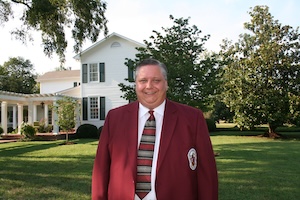 player dunked the ball, he would say hello and give their hometown.” For example, Fyffe got to call Auburn games when Charles Barkley played there, so Barkley’s dunks would be met with “Hello, Leeds!” Chip continued, “So if you ever catch me — when an MTSU player dunks the ball for the first time in a game, and it's hello to their hometown — that was for my buddy Jim.”
player dunked the ball, he would say hello and give their hometown.” For example, Fyffe got to call Auburn games when Charles Barkley played there, so Barkley’s dunks would be met with “Hello, Leeds!” Chip continued, “So if you ever catch me — when an MTSU player dunks the ball for the first time in a game, and it's hello to their hometown — that was for my buddy Jim.”
Chip also vividly remembers a trip with the Vanderbilt basketball team to play the Tennessee Volunteers in Knoxville. At that time, the Vols played at Stokely Athletic Center, and the press box was basically suspended from the roof. On this particular road trip, Chip got there early with his production team and was getting everything set up for that evening’s game, when he spotted a familiar face sitting alone at the far end of the catwalk. It was John Ward, preparing his own game notes. Chip peeled away from his team to go over and say hello. Chip says the moment he introduced himself, Ward pointed a finger at him and said, “You’re the kid from Columbia!” Yes indeed.
Their written correspondence had been several years prior, but Ward still remembered. All those years later, and in the years that followed, Ward always made a point to speak to Chip, whether it was home or away, if Chip was calling games for Vanderbilt or MTSU.
In 1991, after five years of calling games for Tennessee Radio Network, Chip returned to his alma mater. He took on the radio broadcast for the Blue Raiders, while also picking up some marketing responsibilities.
After reestablishing himself at MTSU, Chip reconnected with Cliff Gillespie, whom he had first met as a student. Gillespie was the school’s Director of Admissions, and in those years, was also one of the busiest announcers in the walking horse industry. He called on Chip, who remembers Gillespie telling him, “You need to start doing some of these horse shows. Me and Sands, we get asked to do so many, we need a break every once in a while. We need to throw one your way.” Shortly thereafter, Chip got called over to Gillespie’s office on campus, and Chip was offered the opportunity to announce the Fayetteville horse show. He also started calling the Lewisburg show, which he has done consecutively for decades. He picked up shows in Jackson, Collierville, Corinth, Mississippi, and others. A few years later, after he had established himself as one of the best horse show announcers in the industry, Gillespie brought Chip back to Shelbyville, back to the horse show capital of the world.
Cliff Gillespie served as the show announcer at the Tennessee Walking Horse National Celebration for a few years in the late 1990s before he was diagnosed with cancer. With his health failing, he asked Celebration CEO Ron Thomas if he could bring Chip to center ring with him. Thomas said, “I didn’t know Chip, but I trusted Cliff. I wasn’t sure about two announcers in center ring, but they made it work.” In fact, in 1999, Gillespie’s health was so poor that he had to hand over the entire show to Chip. The next year, Chip remembers, “By 2000, he had responded pretty well to treatment, and he wanted to come back. So what we did was Cliff called the classes and I did all the other announcements and presentations.” It was a system that worked, but it wasn’t for long. Not long after the 2000 Celebration, Gillespie’s condition worsened, and ultimately he succumbed to his illness.
In the spring of 2001, Thomas came calling again. He wanted to bring Chip on full-time. 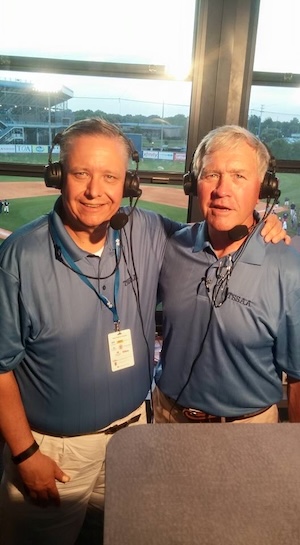 “When Cliff passed away, it was a natural move,” Thomas continued. “It’s always so difficult to follow a legend, but somehow we were able to replace one with another.” Chip also served The Celebration as the Director of Public and Media Relations, a position he would hold for the next eight years. During his tenure, the two men would work side by side to keep the focus on the “show” portion of The World’s Greatest Horse Show. Circumstance, meet pomp. Chip added, “We really worked closely together and that was a big part of our fingerprint on it. It was around that time when we started having the video boards and had more features and more presentations, and the thought was, ‘Okay, how can we, you know, bring all this in and not slow the show down? How can we use these tools that we have and also keep the show moving?’ That's when we started doing some presentations while lineups were going on, or while classes were coming in, so we're not stopping and adding more time. Because when you think about it, if you add just two minutes to a 25-class program, you're adding almost an hour to your show. That was important to us, the word ‘show’ in horse show was not, ‘Let's sit around and watch them stand there.’ Let's do things that are still entertaining during those down times.”
“When Cliff passed away, it was a natural move,” Thomas continued. “It’s always so difficult to follow a legend, but somehow we were able to replace one with another.” Chip also served The Celebration as the Director of Public and Media Relations, a position he would hold for the next eight years. During his tenure, the two men would work side by side to keep the focus on the “show” portion of The World’s Greatest Horse Show. Circumstance, meet pomp. Chip added, “We really worked closely together and that was a big part of our fingerprint on it. It was around that time when we started having the video boards and had more features and more presentations, and the thought was, ‘Okay, how can we, you know, bring all this in and not slow the show down? How can we use these tools that we have and also keep the show moving?’ That's when we started doing some presentations while lineups were going on, or while classes were coming in, so we're not stopping and adding more time. Because when you think about it, if you add just two minutes to a 25-class program, you're adding almost an hour to your show. That was important to us, the word ‘show’ in horse show was not, ‘Let's sit around and watch them stand there.’ Let's do things that are still entertaining during those down times.”
Another footnote that brings Chip an immense amount of pride is his continuation of the legacy of Columbia announcers at The Celebration. He served as the third announcer from Columbia to man the mic in the big oval, following Gilley “Mac” Orr and Bobby Sands.
Throughout his years in Shelbyville, Chip also maintained close ties with MTSU Athletics. He would still do some broadcasting and travel with the teams, while maintaining his horse show schedule. It was very rare that the two overlapped, but it did happen on occasion. One such instance was in 2005, which Chip remembered fondly. On September 3, 2005, MTSU was scheduled to play a midday game in Tuscaloosa, Alabama, against the Crimson Tide. The night before, Chip was in center ring, concluding the second championship night of The Celebration, culminating in Jamie Bradshaw’s victory aboard Jose’s Intimidator in the Four-Year-Old World Grand Championship. The next morning, Chip hopped in a van at 5:30 a.m. and left with the team to head down for the game. Kickoff was at 11 a.m., and as soon as the game concluded, the movie heist portion of this story kicks into gear. A school donor had flown some boosters down to Tuscaloosa for the game, and agreed to let Chip have a seat on the return flight. “As soon as the game is over,” Chip said, “we get off the air, and he's waiting in the car right at the bottom of the elevator at Bryant-Denny Stadium. We jump in the car, go to the Tuscaloosa Airport, and get in this eight-seater, twin-engine plane. We fly to Bomar Field in Shelbyville. My Mom and Dad,” it should be noted, a man who sharpened probably a million pocketknives over the years at The Celebration, “had moved my car to the little terminal there, and my tuxedo for Saturday night was in the back of the car. There was a check beforehand to make sure there was a shower at the airport. We took off at 4, and we landed in Shelbyville at 5:30. I take a quick shower, put my tuxedo on and I was at The Celebration grounds by 6:20 for a seven o'clock show.”
There were many ups and downs during Chip’s years on the mic at The Celebration. He got to call the World Grand Championship class in 2002, which featured a rivalry for the ages with Out On Parole and Shout. The following year, he was again at the helm when one of the most popular champions in recent history, The Whole Nine Yards, won the World Grand Championship with Bill Bobo in the saddle.
Chip was also on the mic, however, in 2006, when there was no World Grand Champion crowned for the first time in Celebration history. Chip admitted to feeling insulated in center ring as the events of that championship night unfolded, but he knew there were rumblings going on in the inspection area. “We could tell something was going on up there, and the only communication we had was by phone. I could hear only one half of a conversation and then, when it finally got down to it, I remember Mr. Thomas hung up the phone, and good Lord.” As Thomas himself remembers, “All I told him was here’s what happened, and you’ve only got a couple minutes to find some soothing words to help prevent a riot. It was one of the most remarkable speeches ever delivered in center ring.” Chip says he does not remember everything he said that night, but anyone who was there can remember that instead of a riot, he had a packed stadium cheering in solidarity. Chip remembered, “Number one, I need to tell as truthfully as I can what’s going on, but I want to tell it to them in a way that's going to cause as little chaos as possible, because there's 25,000 people here that waited all night for this. And I know it's going to be a disappointment. I don't think there's a person who was involved in that that didn't come away with some level of emptiness that night.”
Both Chip and The Celebration rebounded in 2007, and the World Grand Championship class that year remains an important memory for many. Ron Thomas may have thought that Chip’s speech the year before was one of the best ever from center ring. Chip may have topped himself in 2007. Before calling the final class into the big oval, Chip took a deep breath and lifted his microphone. He noted that many people in attendance that night were also there the year before, and he acknowledged how tough of a year it had been. There had been countless meetings in Washington, DC, and just as many restless nights. Then he reached his crescendo. “11 horses were entered in this championship class . . . All 11 horses went through inspection. And, ladies and gentlemen . . . we’ve got 11 horses coming.” And for the first time in two years, “Let’s open the gate . . . for the Tennessee Walking Horse World Grand Championship!”
His final year calling the World Grand Championship came in 2008, and then Chip returned to MTSU. By 2009, he had moved into the play-by-play booth, where he has been the voice of both MTSU football and men’s basketball ever since. These days, there seems to be no end to the hyperbole surrounding the best way to describe his importance to that university. “Mr. MTSU” or “Mr. Blue Raider” are grand but still don’t seem to quite encapsulate it.
Earlier this year, Chip received a call from Heather Carter, the Executive Coordinator at the Tennessee Secondary School Athletic Association. She said her job was to call people who were being inducted into the TSSAA Hall of Fame. Chip thought his role was that of problem solver. “So I'm thinking, okay, whose number does she need, you know? I said, ‘well, who do you need to reach?’” Her answer was not one he was ever expecting: him. He admits to being totally floored.
This excerpt is from the TSSAA’s official announcement of his Hall of Fame induction: “For over 45 years, Chip Walters has been a defining voice across Middle Tennessee, leaving an unforgettable mark on the region's sports broadcasting landscape.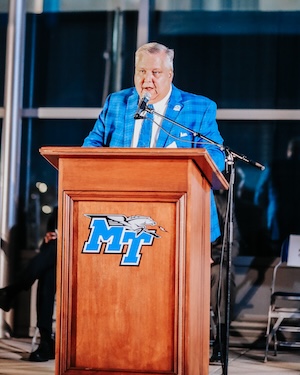 His career, highlighted by dedication, passion and versatility, spans numerous sports, events and communities, making him one of the most respected figures in Tennessee media.”
His career, highlighted by dedication, passion and versatility, spans numerous sports, events and communities, making him one of the most respected figures in Tennessee media.”
Chip joined the Hall of Fame Class of 2025 at a ceremony held at MTSU in April of this year. For the medal ceremony, Chip reached out to the widow of his old high school principal. Hardy Loyd coached basketball at Columbia Central from 1964-74, and then served the next 16 years as the school’s principal, while Chip attended there. Loyd passed away in 2019, so Chip contacted his wife, Dolly. One of their daughter’s, Libby, attended on behalf of the family and was there to put the medal around Chip’s neck. He called the event “perfect.”
In addition, Chip said the response from outsiders was overwhelming. “It was very humbling, the reaction that I got from people, from high school coaches who, somewhere along the way, I either did one of their games on TV or whatever. They were congratulatory and kind of came out of the woodwork a little bit. So it was, it was a really special day.”
After 45 years with a microphone in his hand, it didn’t take long for Chip to identify what has brought him the most joy. “The reaction. Whether it's a game on the radio, or a horse show, somebody will come back and quote me chapter and verse of something I’ve said. In particular, reactions you get from exhibitors who appreciate what you might have said about them somewhere along the way. That's probably the most satisfying part of all that. And when you're on the biggest stage, at The Celebration, the satisfaction is at the end of the night, when you pulled it off, and didn't have any major mistakes. Because that's a big deal, there's a lot of folks there. I use the word professional, but that to me that's very important, to do that in a professional manner. It's just, the crowd reactions you get, those things are probably the most satisfying.” Professional indeed.
When asked what advice Chip would give to young aspiring announcers, he said the main thing was to act like a professional and keep your opinions out of it. “It’s important to congratulate the winners but also celebrate the participants. Lastly, never forget that you’re not just representing yourself, you’re representing the show.” He briefly discussed Hardison Greene, who was the latest young announcer to split time with Bobby Sands in center ring. Hardison took over the call halfway through the night in Belfast earlier this summer and performed admirably. Chip said one thing he should do is, “Make sure I’ve got your number.” Hardison, are you listening?
Good announcers can get the call right, but the great ones pave the way for others. Chip certainly had his share of mentors along the way, and now he acknowledges that it is his turn.
These days, Chip also keeps himself busy with real estate. He maintains his position as the Voice of the Blue Raiders, fret not, but he is a full-service agent for EXIT Realty. Chip says he feels a tremendous amount of pride when he is able to help someone he first met through the walking horse industry. “It really means the world,” he said, “to have the opportunity to first call them in the show ring, and then be able to help them find a place that they can call . . . home.” His hard work has continued to pay off. Last year, the Middle Tennessee Association of Realtors named Chip their 2024 Realtor of the Year. He’s going to need a bigger mantle at this rate.
Chip Walters is as good as it gets. He considers it an honor, getting to call thousands of games and thousands of Tennessee Walking Horse classes. Throughout it all, he has carried himself with professionalism and integrity. From an early age in a small town, Chip knew how to hustle, and he was never afraid to chase his dreams. He knew how to position himself at the right doors, waiting for them to open. His is a voice that now serves as the soundtrack of so many lives. As he made his way across that Hall of Fame stage in April, letting someone else announce his name for a change, one can only wonder how perfectly his old buddy Jim Fyffe could have summed it all up.